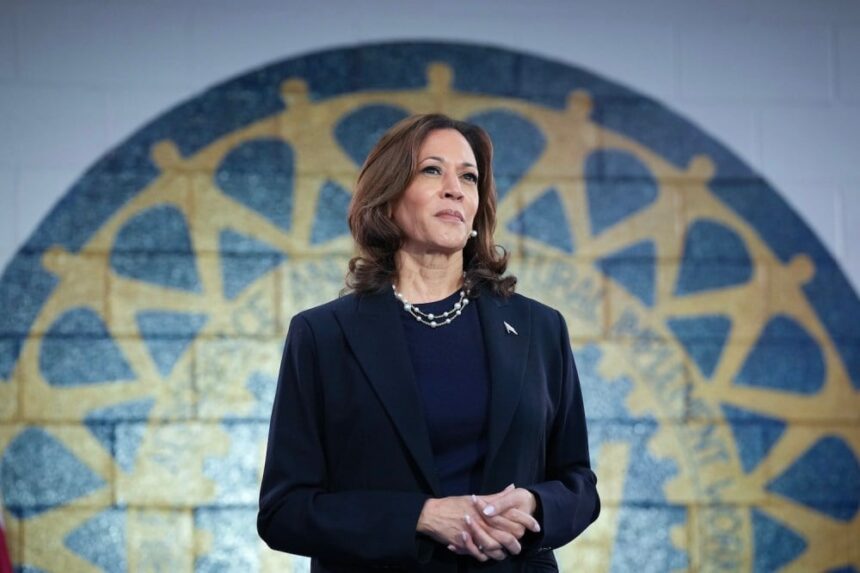After US President Joe Biden withdrew from the presidential race in July 2024, the Teaching, Research, and International Policy (TRIP) Project conducted a survey to gather insights from international relations experts about the potential impact on US foreign policy.
The survey found that these experts largely support Vice President Kamala Harris, who is now the presumptive Democratic nominee. They believe that she has a higher chance of winning against former President Donald Trump than Biden did.
Public opinion polls indicated that Trump had a stronger likelihood of winning, but international relations scholars estimated that Harris had a 52% chance of winning, compared to Biden’s 36%. The scholars also expressed greater trust in Harris’s ability to handle international crises. While Biden and Harris scored similarly high, Trump lagged significantly behind.
This preference for Harris reflects concerns about Trump’s foreign policy approach and his handling of international crises. Despite some alignment with public opinion, experts remain wary of a Trump victory, especially in the context of ongoing global conflicts like Russia’s war in Ukraine and the Israel-Hamas conflict in Gaza.
Read more below.
IR Experts Back Kamala Harris
In the weeks since U.S. President Joe Biden withdrew from the presidential race on July 21, news outlets have focused on shifts in public opinion polls and election prediction markets. Pundits have weighed in on whether former U.S. President Donald Trump or Vice President Kamala Harris—now the presumptive Democratic nominee—will win in November, as well as what the consequences may be for U.S. foreign policy.
International relations (IR) scholars have a unique perspective on these questions—and particularly on the effects of the outcome of the Nov. 5 election on U.S. foreign policy. The Teaching, Research, and International Policy (TRIP) Project at William & Mary’s Global Research Institute, with support from the Carnegie Corporation of New York, recently surveyed IR scholars at U.S. colleges and universities about these issues.
The results reported below are based on responses from 379 IR experts, most of whom are political scientists, surveyed between July 18 and 23. (Complete results can be found here.) Survey respondents were asked their opinions about a range of potential Democratic replacements if Biden left the race, as well as their estimation of the probability that these candidates might prevail in November. The survey was open when Biden announced he would withdraw from the race, but most responses came before his withdrawal from the race.
The IR experts largely supported Harris and believed that she could win in November, even before public polls shifted in her favor—a preference that seems tied at least in part to concerns about how Trump would handle an international crisis.
Who will win the U.S. presidential election?
A public opinion survey conducted by YouGov from July 19 to July 21, the day Biden withdrew, asked respondents who would win a November election between Trump and Biden and a then-hypothetical election between Trump and Harris. At the time, 21 percent of respondents said Biden would definitely or probably win, while 23 percent predicted a Harris victory. Trump fared considerably better, with 57 percent and 55 percent of respondents predicting his victory, respectively. (Other responses included “not sure” and that the two candidates were “equally likely” to win.)
In short, at the moment Biden withdrew from the race, the U.S. public believed Harris would fare only marginally better than Biden and that Trump was likely to beat either Democrat.
The IR experts—surveyed the same week—disagreed. The TRIP survey asked respondents to estimate the probability that Harris would win against Trump in November if she replaced Biden on the Democratic ticket, as well as the probability that Biden would win if the election were between Biden and Trump. The political scientists we surveyed had much greater confidence in Harris’s prospects for victory: On average, respondents estimated that Harris had a 52 percent probability of winning, compared with only a 36 percent probability that Biden would defeat Trump.
Who do IR scholars want as U.S. president?
Our survey results also reveal a clear preference for Harris over Biden as the next U.S. president. When presented with 10 potential candidates for president, 20 percent of the foreign-policy experts reported that they would like to see Harris as the next president, while 9 percent preferred Biden and only 2 percent preferred Trump. (The other options were Secretary of Transportation Pete Buttigieg, former Secretary of State Hillary Clinton, California Gov. Gavin Newsom, Sen. Bernie Sanders, Pennsylvania Gov. Josh Shapiro, Sen. Elizabeth Warren, Michigan Gov. Gretchen Whitmer, and “Other.”)
To some extent, the bias toward Harris and other possible Democratic candidates reflects the fact that 70 percent of the surveyed experts self-identified as Democrats. Nevertheless, just over half of Republicans in our sample selected Trump as their preferred candidate, with Harris garnering 9 percent support from this group. Among Democrats, 23 percent of respondents chose Harris, narrowly making her the second choice behind Whitmer. Ten percent of Democratic respondents chose Biden. Trump did not receive any support among Democrats.
Although Harris outperformed Biden among the IR experts surveyed in our poll, an Emerson College survey of public opinion conducted earlier, on July 7 and 8, found that Harris and Biden performed equally in a head-to-head matchup against Trump. In fact, all nine potential Democratic nominees listed in the TRIP survey fared similarly in the Emerson College survey (within 5 percentage points), but the TRIP-surveyed experts had more varied preferences.
In the weeks since our survey closed, the gap between the public and the experts has narrowed, with increased support among the public for Harris. Comparing two Economist/YouGov opinion polls taken on July 21-23 and Aug. 4-6, when respondents were asked whom they planned to vote for in the presidential election, support for Trump decreased from 44 percent to 43 percent, while support for Harris increased from 41 percent to 45 percent.
Who do IR scholars trust in a crisis?
When asked about the candidates’ ability “to handle a major international crisis as president,” the surveyed IR experts rated Biden and Harris similarly. However, there was a huge gulf between the Democrats and Republicans on the issue.
Survey respondents were asked to indicate their trust in each candidate on a scale from 0 to 100, with 0 indicating a complete lack of trust and 100 indicating complete trust. The scholars signaled an average trust level of 68 for Harris and 70 for Biden, but Trump averaged more than 50 points lower, at 16 on the 100-point scale.
Self-identified Republicans expressed greater trust in Trump; among these respondents, he scored an average of 55. But these Republican experts trusted the former president much less than Democratic experts trusted Harris. This trust gap may be a better measure of confidence in either candidate’s foreign-policy acumen than a simple comparison of experts’ support for their chosen party’s nominee. Respondents who self-identified as independent voters also had significantly more trust in Harris (+38) than Trump to handle a foreign-policy crisis.
The experts also differ sharply from the public in their assessment of the candidates’ foreign-policy abilities. The July 19-21 YouGov poll asked respondents, “If you had to say, who do you think would do a better job handling foreign policy as president if elected this year?” Unlike the IR experts, 44 percent of U.S. adults favored Trump, while 32 percent preferred Harris.
Partisanship also is stronger among the public than the experts. Fully 87 percent of Republicans in the public opinion survey thought that Trump would do a better job at foreign policy. By comparison, Trump scored only an average of 55 out of 100 among Republican foreign-policy experts when they were asked if they trust him to handle a major international crisis.
Theoretical paradigms offer another possible explanation for IR scholars’ trust in the different candidates’ foreign-policy skills and judgment. Increasingly, self-described realists have promoted a U.S. grand strategy of restraint—which discourages military interventions abroad, warns against expanding alliances such as NATO, and discounts the relevance of international rules as a guide to U.S. foreign policy. This stands in contrast to a more liberal U.S. grand strategy of engagement.
But even realist experts are skeptical of another Trump term, as the TRIP survey shows. To start, most realists don’t support Trump’s presidential bid. When given a list of 10 possible candidates, 17 percent of realist respondents preferred that Harris become president, compared with 8 percent who preferred Trump. Although realist scholars were much more likely than liberals, constructivists, or non-paradigmatic scholars to trust Trump, they still trusted Harris more than Trump in a crisis.
On a 100-point scale, realist scholars on average rate their trust in Trump’s ability to handle a foreign-policy crisis 14 points higher than non-realist scholars do. Those who identify with any other IR theory trust Harris more—averaging 15 points higher than realists. It should not be surprising that realists’ average trust in Trump is twice that of non-realists, given both his rhetorical support for more restraint as president and his recommitment to delivering an “America First” foreign policy if he were re-elected.
At the same time, realists express an average level of trust in Harris to handle a major international crisis of 56 on a 100-point scale, compared with only an average trust level of 28 in Trump. The lower trust in Trump among realist scholars may reflect the fact that both realists and Republicans have traditionally advocated a more internationalist foreign policy built around alliances and the limited use of military force to maintain the balance of power, rather than Trump’s skepticism of alliances and greater focus on domestic issues.
Much has changed since Biden and Trump took the debate stage in June. With Harris now topping the Democratic ticket, IR experts both want her to defeat Trump in November—and think that she can. The experts’ strong preference for Harris is likely explained at least in part by the fact that they don’t particularly trust Trump to handle an international crisis.
As the election season enters its final stretch, it’s clear that the people who know the most about U.S. foreign policy and international politics remain worried about a possible Trump victory. It’s also clear that with Russia’s war in Ukraine and the Israel-Hamas war in Gaza still ongoing, whoever wins in November will face numerous foreign-policy challenges.
By Irene Entringer García Blanes, Susan Peterson, and Michael J. Tierney
Source: Foreign Policy







